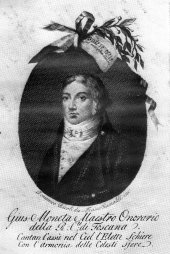After composing a farsa for four voices (its title is unknown), he had, for a young amateur, a remarkable outburst of activity in 1779: his oratorio Il figliuol prodigo was given at S Giovannino degli Scolopi on 20 February, his comic opera I pastori delle Alpi was produced at the Teatro di borgo Ognissanti on 1 June; and he directed, from the first harpsichord, Paisiello’s Il tamburo notturno at the same theatre on 9 September. For the next 20 years he composed a succession of operas, intermezzos and melodramas, as well as sacred and instrumental music. Judging by local reviews, his music was well liked by the Florentines. He won various titles, most importantly maestro di cappella onorario e compositore of the courts of Tuscany (1791) and (later) Parma.
Comic genres made up the majority of Moneta’s dramatic compositions. He was favoured by the Tuscan court as a composer of ceremonial operas and cantatas, such as L’Urano, a cantata (celebrating Herschel’s discovery of the planet Uranus) for the wedding of Archduke Francesco in 1788. But his most original contribution was to the development in Italy of melologo (‘melodrama’ or ‘tragedia lirica’), a new dramatic form which had been cultivated in France and Germany in the 1770s. Moneta set three such dramas in the 1780s: first Il Meleagro (1785), with text by Camillo Federici, who acknowledged his desire to emulate Rousseau’s Pygmalion of 1770; and followed by two more: La vendetta di Medea (1787) and La morte di Sansone (1789).
A collection of five sinfonias has survived which displays suggestions of programmatic intent and what the descriptive style in his lost melologos may have been. His favoured position in Tuscany as composer of orchestral music is indicated by a performance in Florence in 1792 of a ‘piena sinfonia’ before the Palazzo Pitti to welcome Grand Duke Ferdinando III. He also composed six trios for flute, bassoon and continuo and two sonatas for piano and violin.
Like the musical culture of Tuscany in general in his time, Moneta’s works remained largely unknown beyond the region’s borders and the related principalities of northern Italy. The most successful of his comic operas was Il capitano Tenaglia, performed in Livorno and Brescia in Carnival 1784, and Geneva in 1786. His composing apparently ceased in 1799, probably because of the French occupation and rule (1799–1814) during which his patron, Ferdinand III, retreated to Vienna. Moneta was among the composers, educators and musicians who formed in 1801 the Collegio di Professori, devoted to raising music in Florence to its ‘greatest perfection’, promoting the study of music and increasing the number of scholars and ‘dilettantes’. In 1806 he was listed among the ‘interessati’, or financial backers, of the Teatro degl’Intrepidi. Moneta’s obituary in the Gazzetta toscana (1806, no.40) speaks of the ‘universal appreciation and praise’ accorded his music. [from GROVE 2006]
WORKS
Operas:
I pastori delle Alpi (dg, 2, A. Pasquali Valli), Borgo Ognissanti, 1 June 1779
Angelica e Medoro (serenata, 2 pts, P. Metastasio), Porta Rossa, 19 March 1780
La giardiniera accorta (dg, 2), Cocomero, 20 Sept 1781
Il marchese a forza (dg), S Maria, carn. 1783
Il capitano Tenaglia ossia La muta per amore (dg, 2, C. Orcomeno), Livorno, Armeni, carn. 1784
Il Meleagro (melodramma, 3, C. Federici), Cocomero, 22 June 1785
Il tutore e la pupilla, ovvero Amor vuol gioventù (int, 2 pts , M. Coltellini), Cocomero, 26 Dec 1785
L’equivoco del nastro (int, 2), Cocomero, carn. 1786
La vendetta di Medea (tragedia lirica, 5, C. Giotti), Intrepidi, 31 Dec 1787
Orfeo negli Elisi (azione teatrale, 1), Intrepidi, 17 May 1788
Il sacrifizio d’Ifigenia (dramma per musica, 1, Giotti), Cocomero, 3 Feb 1789, 1 aria I-Fm
La morte di Sansone (tragedia lirica, Giotti), Cocomero, 3 Feb 1789
Le nozze all’inferno (farsa, 2, D. Somigli), Piazza Vecchia, carn. 1791
Il conte Policronio, overo Le bugie hanno le gambe corte (dg, 2, G. Squilloni), Poggio a Caiano, 18 Sept 1791, Fc
Le due orfane e i due tutori innamorati (dg, 2), S Maria , 9 July 1792, US-R (excerpts)
Oreste (dramma serio in musica, 3, F. Gonella), Pisa, Accademia dei Costanti, spr. 1798, I-Fc (2 copies)
Le varie poi fauste vicende di Flora (azione teatrale, 1, G. de Gamerra), Cocomero, Advent 1799, Fc
La poetessa capricciosa amante de’ due gemelli (dg, 1), Cocomero, 26 Dec 1799
Revisions of: L. Caruso: La locanda in scompiglio, 1780; G. Sarti: I contratempi, 1781; P. Guglielmi: I due fratelli sciocchi, 1782
Oratori:
Il figliuol prodigo, S Giovannino degli Scolopi, Feb 1779;
Il sacrificio di Jefte, Fucecchio, S Giovanni, 22 Aug 1795;
Il trionfo di Gedeone (dramma sacro, 2), Pergola, 6 March 1798, Fc
Other vocal:
L’Urano (cant., 2, M.A. Giannetti),
3vv, Porta Rossa, 23 March 1788;
6 ariette, v, hp/kbd (n.p., n.d.); I Fc
arias in CZ-BER, US-BEm (doubtful)
2 notturni: vado in traccia d’un bel core / Oh della notte (S ch)
Che bel dì, canzonetta a due voci da cantarsi da popolo fiorentino (2V, arpa, ch)
Cantata sul canto XIX della gerusalemme liberata (V 2vl vla b)
Musica per coro e banda
Stanco amore (S arpa)
La morte di Beatrice Cenci Romana (cant.), S, hp/pf, vn,
Inst:
5 syms., op.2, CH-N;
6 trios, 2 fl, bn NL-DHgm;
2 sonatas, pf, vn (Florence, n.d.),
BIBLIOGRAPHY
M. de Angelis La musica del granduca (Florence, 1978)
R. Zanetti La musica italiana nel Settecento (Milan, 1978)
M. de Angelis La felicità in Etruria (Florence, 1990)
M. de Angelis Melodramma spettacolo e musica nella Firenze dei Lorena (1750–1800) (Florence, 1991)
ROBERT LAMAR WEAVER A Chronology of Music in the Florentine Theater, ii: 1751–1800 (Warren, MI, 1993)










